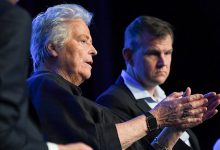The chair of the Energy Security Board has challenged the federal government to look beyond baseload power and embrace flexible sources of electricity generation, labelling old coal-fired generators as “dinosaurs” that will never be a good complement to the renewables rapidly entering the market.
In an extraordinary intervention, ESB chair Kerry Schott said it was clear that solar, wind and battery storage are emerging as the cheapest source of new electricity generation capacity and flexible supply, and propping up an ageing coal fleet is not a long term solution to Australia’s energy troubles.
In her address to AFR energy summit in Sydney, Schott challenged the proposition put forward in an earlier keynote by Federal energy minister Angus Taylor that reliability was one of the most pressing issues facing the electricity market, and that the closure of coal-fired generators should be prevented.
Schott said that the most pressing issue facing the National Electricity Market is managing the security of supply, avoiding the impacts of fluctuations in supply frequency and voltage, and that the reliability of supply is a lesser issue.
“What we actually need in the market is energy that is both firm and flexible,” Schott said. “The thing about coal plants is, because they have to run all the time, is that they are not flexible at ramping up or ramping down.
“They are dinosaurs in that sense for being complementary with renewable energy.”
Rather than maintaining old coal-fired generators in the name of “reliability”, Schott suggested that investments in energy storage and fast-start generation capacity are a more pressing issue to complement the growing supply of cheap, but variable, of solar and wind generation.
Schott pointed to market data that showed the dramatic increase in the number of market interventions made by energy market operators to keep the frequency and voltage of the electricity supply within safe limits.
Schott praised the operation of the Hornsdale power reserve, the original Tesla ‘big battery’ installed in South Australia, for providing a valuable contribution to maintaining reliable system frequency within the South Australian NEM region.
Schott also did not appear to be a personal fan of the Liddell taskforce that had been established between the Federal government and the NSW government, opting not to predict what the outcomes of the task force might look like.
“On the matter of Liddell, there has been a task force set up between the Commonwealth and the New South Wales government, and we will see where that ends up.”
“I don’t know what the outcome [of the Liddell taskforce] will be. I think it’s just better to let them get on with it.”
With the federal Renewable Energy Target achieved ahead of its 2020 deadline, and no further federal renewable energy targets set into the future, Schott warned that the ESB expects that investment in the large-scale renewable energy sector will decline from its recent highs, but that activity in the sector will not come to a complete standstill.
“What [the Energy Security Board] expects to see is a slow down in large-scale renewables after 2020. There will be a slowdown but I don’t think there will be a stop. The price is too attractive. It’s just the cost of the complimentary firm and flexible power that will need to go with it.”
Under Schott’s leadership, the ESB is currently preparing recommendations to the COAG Energy Council on potential reforms to the National Electricity Market to reshape the market in response to new technologies and the evolving needs and expectations of consumers.
The post 2025 market design project will examine options for the long-term energy market framework, including how the market deals with emerging reforms related to renewables, demand response mechanisms, distributed energy systems and legacy network investment.
“The energy market as it is structured at the moment is not fit for adapting to this kind of change. What it is not good at is acting quickly to stuff. What it is quite good at is managing incremental change. But that’s not what we have.”
“One of the things the Energy Security Board is looking at is how rules get made. At the moment they are being made in an incremental way, but because there’s so much change at the moment, companies are feeling overwhelmed.”
“The [Australian Energy Market Commission] is feeling very overwhelmed with the amount of rule changes they are dealing with. What we’ll need to do is develop a way to prioritise things, and start dealing with rule changes in bundles,” Schott added.
The post 2025 market design project will examine options for the long-term energy market framework. Schott highlighted the need to change the way the energy market approaches system planning and in response to a changing technology mix and changes to the geographical distribution of energy resources.
Many established renewable energy projects have found themselves facing significant cuts to revenues due to massive reductions in marginal loss factors, particularly impacting solar and wind projects built on the edges of the energy network.
“We’ve got a grid at the moment that’s not fit for purpose. The reason why it is not fit for purpose is that it was developed decades ago to take power from large coal generators to the cities and those coal-fired generators are in the Latrobe Valley and the Hunter,” Schott said.
“Renewables are not in the Latrobe Valley and the Hunter, they happen to be in rural areas, and we need to change the grid to so we can get from that new generation source to the cities. What we’ve got at the moment is a long skinny string into town and Australia is well known for having one of the large geographic grids in the world.”
Schott will deliver the recommendations of the ESB’s Post 2025 energy market design project to the COAG Energy Council, which is set to meet for the first time in almost a year in November.










